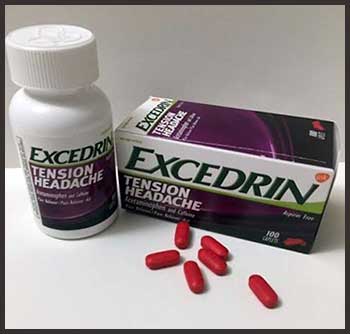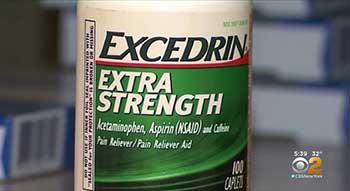Headaches are one of the most common health complaints, with over 50 million Americans experiencing headaches each year. Two popular over-the-counter medications for treating headaches are Excedrin Tension Headache and Excedrin Extra Strength.
But what’s the difference between these two medications? Which one is more effective for treating different types of headaches?
This comprehensive guide examines the key features, pros and cons of Excedrin Tension and Excedrin Extra Strength to help you determine which medication may be better suited for your headaches.
A Brief Comparison Table
| Feature | Excedrin Tension Headache | Excedrin Extra Strength |
| Best for | Mild to moderate tension headaches | Severe tension headaches, migraines, cluster headaches |
| Pain relieving ingredients | Acetaminophen 250mg, Aspirin 250mg, Caffeine 65mg | Acetaminophen 250mg, Aspirin 250mg, Caffeine 65mg |
| Onset of action | 30 minutes | 30 minutes |
| Duration of effects | 4-6 hours | 4-6 hours |
| Forms available | Caplets | Caplets, gelcaps, liquid gels |
| Safety | Safe when used as directed. Lower misuse potential. | Safe when used as directed. Higher overdose risks. |
Overview Of Excedrin Tension And Excedrin Extra Strength
Excedrin Tension Headache and Excedrin Extra Strength contain similar active ingredients but in different dosages.

Excedrin Tension Headache
Excedrin Tension Headache contains the following active ingredients per tablet:
- Acetaminophen 250 mg – A pain reliever and fever reducer
- Aspirin 250 mg – A nonsteroidal anti-inflammatory drug (NSAID) that relieves pain and inflammation
- Caffeine 65 mg – A stimulant that enhances the effects of pain relievers
It comes in caplet form. The usual adult dosage is 2 caplets taken every 6 hours while symptoms persist. The maximum daily dose is 6 caplets in a 24 hour period.
Excedrin Tension Headache is specifically formulated to treat tension headaches, which are the most common type of headache. Tension headaches cause mild to moderate pain that feels like constant pressure around the head, neck, or shoulders.
Excedrin Extra Strength
Excedrin Extra Strength contains the following active ingredients per caplet:
- Acetaminophen 250 mg
- Aspirin 250 mg
- Caffeine 65 mg
It also comes in caplet form, with the same recommended dosing as Excedrin Tension.
However, Excedrin Extra Strength is designed to relieve more severe pain symptoms associated with migraines as well as tension headaches.
Now let’s compare the key features between these two medications.
Key Feature Comparison
Here is an overview of the main similarities and differences between Excedrin Tension Headache and Excedrin Extra Strength:
- Pain relieving ingredients – Both contain acetaminophen, aspirin, and caffeine as active ingredients. However, Excedrin Extra Strength has a higher dosage of acetaminophen (250 mg Vs. 500 mg) and aspirin (250 mg Vs. 250 mg) per caplet.
- Headache type – Excedrin Tension Headache is formulated for treating tension headaches specifically. Excedrin Extra Strength can treat tension headaches as well as more severe migraine headaches.
- Onset of action – Both medications begin working within 30 minutes. However, Excedrin Extra Strength may provide faster relief.
- Duration of effects – The pain relieving effects last about 4-6 hours for both medications before re-dosing is needed.
- Forms available – Both are available as oral caplets but Excedrin Extra Strength also comes in gelcap and liquid gel forms.
- Safety – When used as directed, both are considered safe and effective. But Excedrin Extra Strength has a higher dosage of acetaminophen so taking more than the recommended amount raises liver toxicity risks.
Now let’s dive deeper into the pros and cons of each medication.
Pros And Cons Of Excedrin Tension Headache
Here are the main advantages and disadvantages of using Excedrin Tension Headache:
Pros:
- Specifically designed to treat tension headaches
- Combination of pain relievers provides more complete tension headache relief
- Lower dosage appropriate for mild to moderate tension pain
- No major safety concerns when used as directed
- Low risk of medication overuse headaches
- Caplet form rapidly disintegrates
Cons:
- May not be strong enough to relieve severe migraine pain
- Contains aspirin which can cause stomach upset in some people
- Not a good option for people with aspirin sensitivity
- Only comes in caplet form
Pros And Cons Of Excedrin Extra Strength
Here are the key pros and cons of using Excedrin Extra Strength:

Pros:
- Can treat both tension headaches and migraines
- Higher acetaminophen dose provides stronger pain relief
- Fast acting – starts relieving pain within 30 minutes
- Available in caplet, gelcap, and liquid gel forms
- Liquid gel form allows rapid absorption
Cons:
- Higher acetaminophen dose raises liver toxicity risks if exceeded
- Not intended for long-term headache treatment
- Contains aspirin which can cause stomach upset in some people
- Not a good option for those with aspirin sensitivity
- More prone to medication overuse headaches if taken too frequently
Now that we’ve compared the key features and pros and cons, let’s examine which medication may be better for different headache types.
Excedrin Tension Vs. Excedrin Extra Strength For Different Headaches
Whether Excedrin Tension or Excedrin Extra Strength is better suited for your headaches depends on the type and severity of pain.
Tension Headaches
For tension headaches causing mild to moderate pain, Excedrin Tension is typically the better choice. The lower dosage and specific tension headache formulation make it a safer option for the frequent tension headaches many people experience.
However, if your tension headaches are very painful and debilitating, Excedrin Extra Strength may provide more robust relief. Just take care not to overuse it.
Migraines
For migraine attacks, Excedrin Extra Strength is usually more effective. The higher dosage and rapid liquid gel form help knock out the intense throbbing pain, nausea, and other migraine symptoms.
Excedrin Tension may take the edge off mild migraines but often does not have enough pain-fighting power to relieve severe migraine pain.
Cluster Headaches
Cluster headaches involve very intense, localized pain around one eye or one side of the head. For cluster headache attacks, Excedrin Extra Strength liquid gels are the better option to help abort the excruciating pain quickly.
Sinus Headaches
Sinus headaches involve pain and pressure around the sinuses, cheeks, and forehead due to sinus congestion. For sinus headache relief, either medication can provide some benefit. But Excedrin Extra Strength may work better due to containing a higher dosage.
Using Excedrin Tension And Excedrin Extra Strength Safely
When used according to the package directions, both Excedrin Tension and Excedrin Extra Strength are generally safe for adults. However, the following precautions are important for safe use:
- Take only the recommended dose. Exceeding the recommended limits raises toxicity risks.
- Do not take either medication for longer than 10 days for headaches without consulting a doctor first.
- Avoid use if you have liver disease, gout, or an aspirin allergy/sensitivity.
- Limit caffeine intake from other sources like coffee when taking Excedrin to avoid caffeine overdose risks.
- Do not take either medication within 6-8 hours of a different pain medication.
- Stop use and consult a doctor if headaches worsen or don’t improve after continued use.
Also note that while generally safe for adults, these medications should not be given to children under 12 years old without medical supervision.
Now let’s recap some key tips for choosing between Excedrin Tension or Excedrin Extra Strength.
Also Read: Is GenuTrain Better Than Sports Knee Supports?
Recap: Choosing The Right Medication
- For mild to moderate tension headaches, Excedrin Tension is usually the better option.
- When tension headaches are very painful or debilitating, go with Excedrin Extra Strength.
- For migraine attacks, Excedrin Extra Strength liquid gels work fastest.
- Excedrin Extra Strength is also better for intense cluster headaches.
- For sinus headaches, either can provide some relief but Extra Strength may work better.
- Take the lowest effective dose needed to relieve symptoms.
- Do not exceed dosage limits or use longer than 10 days without consulting a doctor.
- Check with your doctor before use if you have liver problems, gout, or aspirin allergy/sensitivity.
Frequently Asked Questions (FAQ)
Excedrin Extra Strength is the strongest formulation. It contains 500 mg of acetaminophen compared to 250 mg in Excedrin Tension Headache. The higher dose provides more powerful pain relief.
Excedrin Tension Headache is specifically formulated to relieve tension headache symptoms. It can be used for headaches feeling like constant head pressure or tightness around the head, neck, and shoulders.
In 2012, some batches of Excedrin Extra Strength were temporarily recalled along with other Excedrin products. This was done voluntarily by the manufacturer after plastic particles were found in certain bottles. But after resolving these quality control issues, Excedrin Extra Strength was relaunched and is still available today.
For treating migraine attacks, Excedrin Extra Strength (especially the liquid gel caps) typically works better than Excedrin Tension. The higher doses of pain relieving ingredients help curb the intense throbbing pain, nausea, and other symptoms of a migraine.
The Bottom Line
In summary, for mild tension headaches, Excedrin Tension is the safer choice while Excedrin Extra Strength works better for more severe headache pain including migraines and cluster headaches.
When used as directed, both medications can be effective options for headache relief. Discuss your specific headache symptoms with your doctor to help determine if one medication may be better suited for your particular headaches.
